General Help
Get information about our website or Droom services
The Electric Vehicle (EV) revolution is gradually picking pace in India. If you had imagined driving electric cars on Indian roads nearly 5-7 years back, it would have sounded as weird as trying off-roading with a BMW Z4 or Jaguar F-Type. But as they say, 'Change is the law of nature' and rightly so we have witnessed an unprecedented rise in the popularity of EVs in the past few years in the Indian market. The effort has been collective - be it the manufacturers, be it the government or be it the people in the country. Furthermore, what has really propelled the buyers to turn towards electric vehicles is the alarming levels of air pollution and skyrocketing fuel prices. The central as well as the state governments are also playing their part and encouraging people by offering various subsidies and benefits on the purchase of electric vehicles.
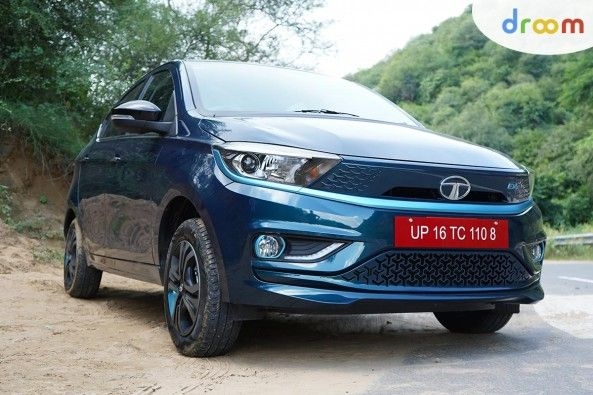
Tata Motors, one of the leading home-grown automakers in India, has been at the forefront of the EV revolution. If we go down the memory lane, it was the 2018 Auto Expo in Greater Noida, when Tata had presented its first ever electric vehicle in the form of Tigor EV. Though it was reserved only for commercial purposes, predominantly for fleet taxi operators with an abysmal range of 142 kilometres on a full charge. Fast forward to 2021, Tata Motors has introduced the all-new Tigor EV for the private buyers with a whooping driving range of 306 kilometres. Recently, we got an opportunity to take the Tigor EV for a spin and we are glad to share our findings regarding the sedan with all of you today which (co-incidentally) also happens to be the World EV Day 2021!
Tata Motors has not played much with the styling of the Tigor EV and kept it simple yet sophisticated which is identical to the regular ICE version of the sedan. It looks proportionate and upright with the front fascia retaining most of the features of the standard sedan. It boasts of projector headlamps with LED DRLs, 'Humanity Line' front grille with tri-arrow pattern and fog lamps. However, what lends the Tigor EV an identity of its own is the blue bar positioned below the Humanity line grille. The fog lamp units have been carried over from the ICE model. Moving on to the side profile of the sedan, it gets alloy wheels and a pair of electrically operated ORVMs with turn indicators. The ORVMs can be folded even from the Smart key fob of the sedan. At the rear end, there is nothing new but 'EV' and 'Ziptron' badgings in a blue shade to indicate that it is an all-electric vehicle powered by the company's Ziptron technology. Also, at the windshield, it gets a 'Vocal for Local' sticker which states that it has been locally developed in India. It is offered in two color options namely Signature Teal Blue and Daytona Grey.
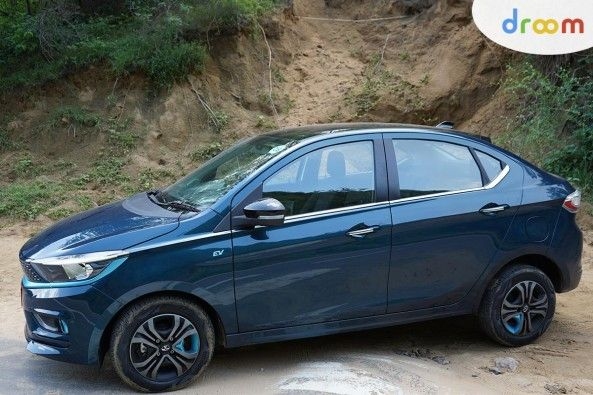
So, as far as the overall design of Tata Tigor EV is concerned, it is more or less similar to the petrol model. Tata Motors hasn't tried to do anything fancy here and tried to keep it uncomplicated which we think will go well with the buyers. The addition of blue elements here and there accentuate the appearance of the sedan in an amazing manner. The IMPACT 2.0 design language creates its magic once again to make the Tigor EV desirable, tempting and attractive.
Enter the cabin of Tata Tigor EV and the first thing you are going to see is the fabric seats flaunting the same tri-arrow theme as the front grille. The tri-arrow pattern in blue theme compliments the black seats really well. Needless to say, the seats are comfortable with premium fabric quality and adjustable headrests. The cabin is offered in a dual-tone light grey and black upholstery which is premium in nature and gives a fresh feel. The plastic quality of dashboard and AC controls is decent and augurs well with the price tag of the sedan. Tata Motors has not left any stone unturned to make it a roaring success by including a plethora of premium and up-market features in the sedan in the form of a flat-bottomed multi-function steering wheel, all-digital instrument cluster, fully automatic temperature control, rear centre armrest with cupholders, front and rear USB charging cable and a 7-inch touchscreen infotainment system with Apple CarPlay & Android Auto.
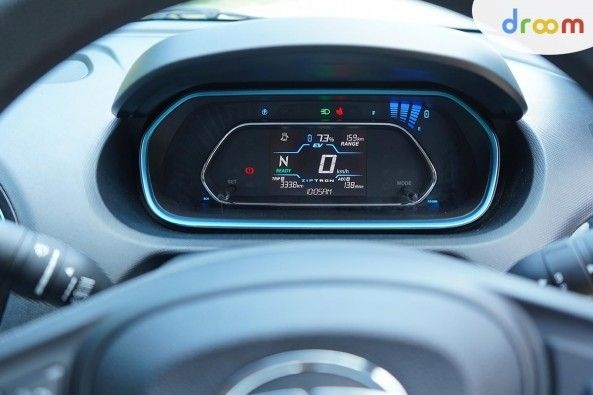
The steering wheel unit gets audio and telephonic controls on the left side for the convenience of the driver. They are easy to operate and respond in less than a fraction of a second. The AC performance is quite good and you get two rotary dials for setting the temperature and adjusting the fan speed. The AC controls are evenly placed at the centre console below the infotainment unit with ample spacing so that it doesn't feel too crowded. The company has equipped the sedan with a Harman sourced 7-inch touchscreen infotainment system which is compatible with Apple CarPlay & Android Auto. It also offers Bluetooth connectivity while also acting as the reverse parking camera. The brand has offered 35 connected car features with the Tigor EV through the Tata Motors ZConnect (powered by iRA) Mobile App which includes Panic notification, Geo-fencing, Find my car, Remote door lock/unlock, Remote cooling, Trip analytics & driver behaviour score etc. These features are really flabbergasting and help the driver immensely while taking the drive experience to a next level.
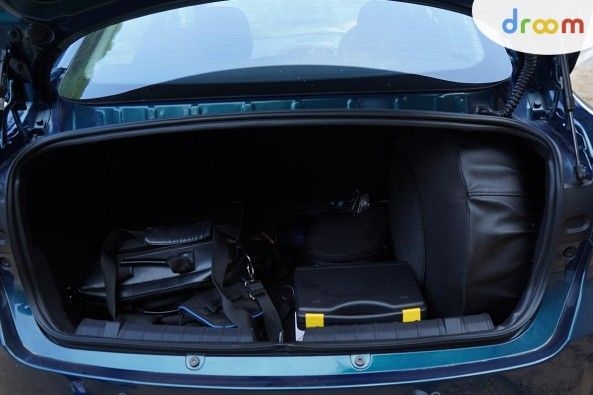
The driver's seat is height adjustable and it can be modified as per the convenience of the driver fairly easily. One of the best features in the Tigor EV is the inclusion of 12V USB charging ports for both the front occupants and rear occupants. The most exciting feature which we felt in the cabin was the all-digital instrument cluster which comes with Blue accents. It provides a lot of information to the driver while on the move. The color combination and font size is accurate for the human eye and it doesn't take any effort to read it from the cluster. One can see the Distance to Empty (DTE), Battery Charge % left, Digital Clock, Door open and Key in Reminder, & Driver and Co driver seat belt reminder features on the cluster.
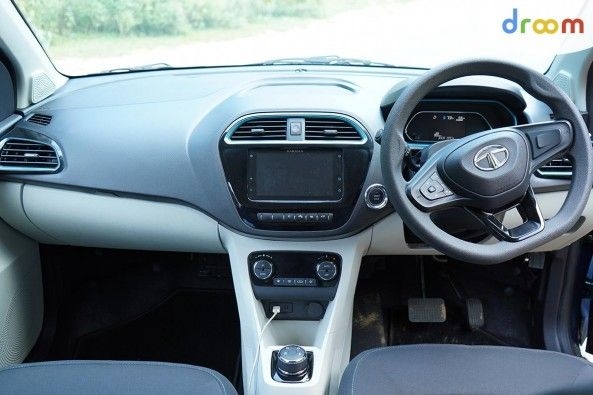
If we talk about the legroom for the rear occupants, it is decent for an average height person but if you are taller than 6 feet then you might feel a bit cramped. Same for headroom, if your height exceeds 6 feet, then you might feel your head touching the roof. As for shoulder room, it is adequate for three (thin) people but if you are a tad bulky, then it will strictly be a 2+2 setup. And more so, if you wish to use the centre armrest and enjoy your drink as it comes equipped with cup holders. However, we missed the rear AC vents in the sedan and wish that the officials at Tata Motors take a note of it and include it soon. So, in all, the interior cabin of Tata Tigor EV is quite modern, elegant and feature packed. It provides the buyers a myriad of bells and whistles to play with and enjoy every moment of their journey!
Tata Motors has used the revolutionary 'Ziptronic' technology in the Tigor EV which is indeed a welcome news as the commercial version of the sedan was deprived of it. This is the same technology that has been used in the all-electric version of the Nexon SUV. The Ziptronic tech works wonderfully well for the Tigor EV as it provides a higher driving range and more power output. The sedan uses an IP 67 rated 26 kWh Lithium-ion battery pack which is connected to a permanent magnet synchronous electric motor. The electric motor returns top power of 73 bhp and peak torque of 170 Nm while mated to a single speed transmission for automatic like drive. The power delivery is linear throughout the driving, be it during thick city traffic at low speeds or be it on the highways. We drove the Tigor EV for more than 3 hours on a stretch and we never felt cramped for power. The brand has also offered two drive modes namely Drive & Sports which can be toggled easily through a rotary dial situated near the hand brake.
The suspension duties have been carried out by Independent MacPherson strut with coil spring upfront while the rear features a Twist beam with dual path strut. The suspension system works amazingly as it soaked almost all the potholes on the roads and very less impact was felt by us in the cabin. The company engineers also confirmed that they have retuned the system as compared to the petrol version for the battery pack and Indian road conditions. As far as braking is concerned, the Tigor EV has been presented with front Disc brake and rear Drum brake. They work in tandem with ABS & EBD which are offered as standard equipment with the sedan. The braking was impressive and the brake pedal responds extremely well to the slightest of pressures applied on it.
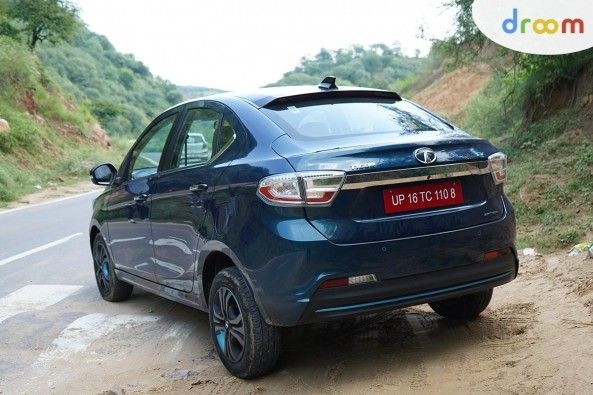
What made performance even more exhilarating was the electronic steering wheel as it dances on the touch of your fingertips. It feels rather light in hands and works extremely well with the directions, especially during corners. Tata Motors claimed that Tigor EV delivers 306 kilometres but we can state with conviction that in real world conditions the driving range is somewhere between 220-250 kilometres and it particularly depends on your driving. If you drive in the 'Drive' mode it can probably last till 270 kilometres but if you opt for the 'Sport' mode then it gets reduced rapidly to around 200 kilometres. The Sport mode is the most fun to have on the sedan as it feels like you are driving some petrol-powered performance car due to the brisk acceleration. The sedan easily floats on the corners with no cabin noise whatsoever. The 0-80 percent battery charging time for the Tigor EV via a 15A wall mounted AC socket is 8 hours and 30 minutes and we feel that in future Tata will further work on it to make it even lesser. The charging time for 0-80 percent through a 25 kW DC fast charger is merely 65 minutes which is a comforting factor for the owners of this sedan. So in all, we were overwhelmed with the driving dynamics and performance of the Tigor EV and wouldn't have asked for a better sedan to start the electric vehicle segment with.

Renault Triber Vs MG Hector Vs Hyundai Creta Comparison based on various factors like Price, Fuel Capacity and Mileage, Features, Specifications.
Read More
Does the 2nd Generation Hyundai Creta supersede its predecessor, well that is what we are here to find out?
Read More